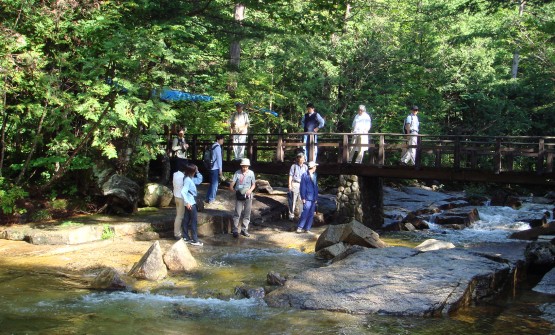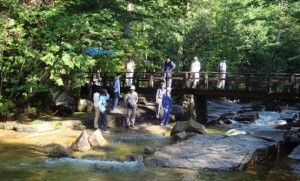Most people would agree that trading the noise and pollution of the city for time spent in nature is a good thing. We all know we feel better in a natural environment and we bring potted plants and cut flowers into our urban lives to compensate for the dearth of nature in the built environment. Now exciting new research is confirming the health promoting, stress reducing effects of contact with nature and the overall benefits to our physical, emotional and mental wellbeing.
Horticulture therapy – the healing powers of the experience of being in nature and interacting with plants – is an ancient concept made anew. The Pharaohs were advised in Egyptian papyri to walk in the gardens for spiritual healing, and today nursing homes, mental institutions and prisons are just a few of the places you can find horticulture therapy being practiced.
As long ago as 1982 the Forest Agency of Japan advocated the practice of walking in the forest and being in the presence of trees as useful health-promoting activity. Now it seems the genie is out of the bottle and everyone is talking about it. As fast as the forests and wild lands are being lost to development, we are coming to realize how truly valuable they are. The real and measurable physiological benefits of being in nature are not the norm for most people today. Somewhere around 2 years ago the world population passed the point where more than 50% of the population live in urban environments. Now the predominant experience of people’s daily lives is urban, manmade, straight lines and the containment of nature.
The concept of healing properties inherent in the experience of nature even has a name: Shinrin-yoku in Japanese, Sanlimyok in Korean, and it is being promoted as an antidote to the manufactured, artificial lives most of us lead. Studies conducted in the last few years even show forest bathing increases a component of the immune system that fights cancer.
Measuring stress markers in men and women before and after a two-night/three-day forest bathing trip revealed a significant boost in Natural Killer cell activity. The increase was observed as long as 30 days after the trip. Follow-up studies showed a significant increase in NK activity was also achieved after a day-trip to a forest, with the increase observed for seven days after the trip.
Forest bathing significantly decreased the scores for anxiety, depression and anger in one Japanese study and led the researchers to suggest that forest bathing may help to decrease the risk of psychosocial stress-related diseases.
Researchers suggest that human immune activity may be increased in response to breathing in air containing phytoncide (wood essential oils) like α-pinene and limonene, which are antimicrobial volatile organic compounds emitted from trees to protect them from rotting and insects.
Results of a research project initiated by the Japanese government from 2004-2006, to investigate the therapeutic effects of forests on human health from a scientific perspective, shows that Forest bathing trips reduce the concentration of cortisol in saliva, reduce the concentrations of urinary adrenaline and noradrenaline, reduce prefrontal cerebral activity, reduce blood pressure and stabilize autonomic nervous activity in humans.
Below is further research into the health benefits of forest bathing as a way to enhance human natural killer activity and protect against cancer:
Int J Immunopathol Pharmacol. 2007 Apr-Jun;20(2 Suppl 2):3-8.
Forest bathing enhances human natural killer activity and expression of anti-cancer proteins.
Li Q, Morimoto K, Nakadai A, Inagaki H, Katsumata M, Shimizu T, Hirata Y, Hirata K, Suzuki H, Miyazaki Y, Kagawa T, Koyama Y, Ohira T, Takayama N, Krensky AM, Kawada T.
Department of Hygiene and Public Health, Nippon Medical School, Tokyo.
Abstract
In order to explore the effect of forest bathing on human immune function, we investigated natural killer (NK) activity; the number of NK cells, and perforin, granzymes and granulysin-expression in peripheral blood lymphocytes (PBL) during a visit to forest fields. Twelve healthy male subjects, age 37-55 years, were selected with informed consent from three large companies in Tokyo, Japan. The subjects experienced a three-day/two-night trip in three different forest fields. On the first day, subjects walked for two hours in the afternoon in a forest field; and on the second day, they walked for two hours in the morning and afternoon, respectively, in two different forest fields. Blood was sampled on the second and third days, and NK activity; proportions of NK, T cells, granulysin, perforin, and granzymes A/B-expressing cells in PBL were measured. Similar measurements were made before the trip on a normal working day as the control. Almost all of the subjects (11/12) showed higher NK activity after the trip (about 50 percent increased) compared with before. There are significant differences both before and after the trip and between days 1 and 2 in NK activity. The forest bathing trip also significantly increased the numbers of NK, perforin, granulysin, and granzymes A/B-expressing cells. Taken together, these findings indicate that a forest bathing trip can increase NK activity, and that this effect at least partially mediated by increasing the number of NK cells and by the induction of intracellular anti-cancer proteins.
http://www.ncbi.nlm.nih.gov/pubmed/17903349
The Harmony of Nature and You
Teresa Siqueira April 28, 2022
https://porch.com/
You don’t have to look deeply to see the harmony and balance that exists within our natural world. The way plants, animals, and ecosystems synchronize to thrive is nothing short of a miracle. Even when that balance is disrupted, they quickly adapt to return to equilibrium. Although it may not seem like it in the world we live in today, it is instinctual for us as humans to fall in line with the ebb and flow of nature.

